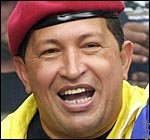"Let us never forget that government is ourselves and not an alien power over us. The ultimate rulers of democracy are not a President, Senate or government officials but the voters of this country." - President Franklin Delano Roosevelt
Dear President Bush,
If you value democracy, respect the voters of Venezuela.
Since 1999, the citizens of Venezuela have repeatedly voted for a government that -- unlike others in the past -- would share their country's oil wealth with millions of poor Venezuelans. This has happened: the vast majority of poor Venezuelans now have access to free health care in their neighborhoods, subsidized basic foods, and increased educational opportunities.
These social and economic changes have come about through a democratic process of free and fair elections. That has been the consensus opinion of international election observers -- including experts from the Carter Center, the Organization of American States, and the European Union. With the help of the international community, Venezuelan elections have become one of the most heavily scrutinized and transparent systems in the world.
But the Bush Administration has not respected the democratic process in Venezuela. In April of 2002, Administration officials lent their support to a military coup against the democratically elected government. According to the U.S. State Department Office of Inspector General, our government provided "support to individuals and organizations understood to be actively involved" in this military coup.
This December, Venezuelans will once again participate in the process of choosing their president through democratic elections. When the outcome is confirmed by Venezuelan authorities and the international community, it is our duty as Americans to respect the results.
We call for a new policy of engagement with Venezuela. It is long past time to abandon the Cold War framework that has portrayed Venezuela as an "enemy," and has in the process alienated most of our neighbors to the South. This new policy would respect the democratic process in Venezuela and put an end to U.S. funding of opposition political groups -- a practice which is illegal in the United States.
As Americans who cherish the right of people to make their voice heard through free and fair elections, we call on our government to respect those noble principles in Venezuela, and not deny the voters of Venezuela the same right to democracy that we uphold for ourselves.
Signed,
The Reverend Jesse Jackson
Cornel West, PhD.
Dolores Huerta
Tom Hayden
Go
here to sign the petition.

